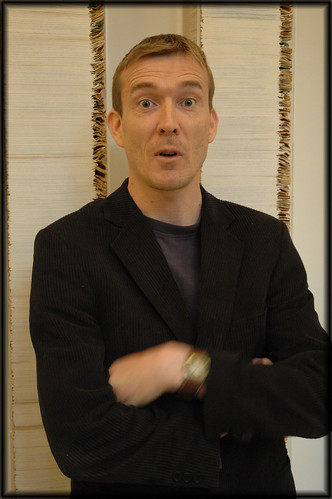 |
| This seemed a fitting picture |
If you've read any of Mitchell's work, and I can't recommend strongly enough that you do, you'll know instantly that here is a man who has a nearly unprecedented way with words. However, he seemed to be struggling sometimes to find the right word, and this hesitancy was compounded by the unbridled joy evident in his voice and gestures as he talked about writing he loved. I had a hunch that this wordsmith couldn't possibly be searching for the right word - his overall eloquence was too great for that - and I recalled that the protagonist in Black Swan Green has a stutter. A bit of research today confirmed my suspicions that Mitchell himself suffered from a stutter as a child. I don't think the casual observer would have made the connection, though; if his difficulties with speech were as bad as Jason's, he's come so far that he comes off as someone lovably bumbling instead of a sufferer of a speech impediment.
For his short stories, Mitchell selected "Vanilla Bright Like Eminem" by Michel Faber and "The Burning Palms" by Claire Keegan, and both were brought spectacularly to life by actors Daniel Gerroll and Patricia Kalember. Mitchell read his notes from a black Moleskine notebook. When he described Keegan's writing, he seemed hardly able to contain his admiration for the way she put words together to convey meaning far deeper than their individual definitions. He read us a short sentence from the first part of the story, then twittered, "She packs so much into this little suitcase [meaning the sentence] and then, blaugh [estimation of spelling; word accompanied by exploding gesture made by hands], it just...spills meaning and implications and resonances..." He followed this with a happy sigh. Then, of another sentence, "'...rain dripping on the rhubarb leaves.' You can just hear the drops in that sentence, can't you?" He tapped the microphone with a finger several times, murmuring dreamily,"drip, drip, drip." If Mitchell wasn't an author, he should be teaching poetry to sullen youths, as there's absolutely no chance of their being able to remain less than enchanted by the art of the written word after three minutes with this man.
After hearing the short stories, we were treated to a discussion between Mitchell and Freeman. We learned that Mitchell writes a long, thorough biography for every one of his characters before beginning a novel, which explains why his characters are so astoundingly three-dimensional and also why it takes him three or four years to write each book. He said that events from their lives often work their way into his books, though he's never had one of these biographies turn into its own book. Freeman commended Mitchell for the breadth of time periods, settings, and genres covered by his books. When asked about his vision of the movie version of Cloud Atlas as compared with the book he wrote by the same title, he laughed that he was really glad the director had re-imagined so much of it because a film made to follow his book exactly "would suck." The movie comes out in just a few days. We watched the trailer, and then one last actor (wonderful Campbell Scott) read a chapter from the book that took the form of a letter written by an irreverent witty, gay composer in the 1930's whom I'm devastated I'll never meet. It was, he was mind-blowing. I must read this book immediately.
I've written a lot about being delighted by David Mitchell. Now for the devastation in the title of this post: because he flew back to the UK immediately after the talk, he did not do a book signing. I was crushed, and ordered something very unhealthy at the diner we went to afterward, hoping smother my pain in french fries and American cheese while Ed tried very hard to make cheerful conversation, even offering to sign my books for me while feigning a charming, bumbling British accent.
So David Mitchell, if you stumble across this post some day, reach out. Let's make a deal in which I get one of your signed books and you can have...my firstborn? It would be a fair trade to own a book signed by a writer with as titanic a talent as yours.
No comments:
Post a Comment